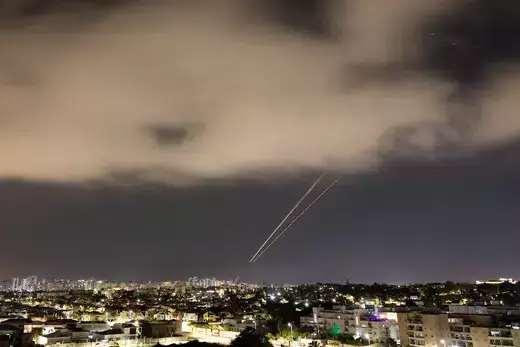Ray Takeyh
 Was the scope of Iranian attacks—drone swarms and missiles involving multiple Iranian proxies—surprising?
Was the scope of Iranian attacks—drone swarms and missiles involving multiple Iranian proxies—surprising?The attack appears to have consisted of more than three hundred drones and some cruise and ballistic missiles, according to Israeli defense officials. It must be noted that this is the first time since coming to power in 1979 that Iran's Islamic regime has directly attacked Israeli territory. Even though the vast majority of drones and missiles were shot down by Israeli defenses, along with reported help from U.S. and Jordanian forces, this is a new and alarming situation.
How serious is the risk of escalation to more direct attacks between Iran and Israel? Could this trigger an Israeli attack on Iranian nuclear facilities, for instance?
Neither side wants this conflict, but it is upon them. And it is hard to see how they can de-escalate. Israel will mostly likely retaliate. Its deterrence posture mandates a response to such an attack on its territory, even if there are no casualties. And then Iran has to respond.
Iran’s Islamic Revolutionary Guard Corps said they would retaliate against any country that assists Israel in responding to Iran’s attack. How serious is such a threat?
The warning mentioned the United States. The possibility of Iran directly attacking U.S. forces should not be taken seriously. Iran does not wish to prolong or widen the war. A direct clash with the United States is what the Iranian leadership fears at this time. Given America’s superior firepower should it join with Israel, then the situation for Iran will be dire.
Still, Iran can induce its proxies to once more target U.S. forces once the current crisis simmers down. The proxy war strategy has had the advantage of shielding Iran from direct retaliation by the United States, as the Biden Administration has focused its response on proxies.
What is the risk of U.S. forces or other forces in the region becoming more intensely involved?
It remains to be seen if Iran also activates its many proxies to attack U.S. personnel. From Tehran’s perspective, they have retaliated for the killing two weeks ago of their senior officers stationed in Damascus and thus are prepared to end the conflict here. But of course, some of the proxies, such as the Houthis in Yemen, could still act independently. But Iran will seek to avoid directly targeting U.S. troops.
How might it be possible to de-escalate the tensions and which countries could play an influential role in easing hostilities? Can the UN Security Council play a role?
There is bound to be considerable mediation diplomacy. Both parties’ great power patrons will have a role to play here. China has come out with a statement expressing grave concern. The Biden Administration will also most likely try to do so with Israel and is also planning to enlist sanctions help with the Group of Seven countries. Though Israel has asked for a special session of the UN Security Council on the attacks, the chamber is unlikely to prove an effective venue for resolving this conflict given divisions among the chambers’ veto-wielding members. And if Iran and Israel ratchet up their conflict, they may not be entirely restrained in the early stages.
No comments:
Post a Comment